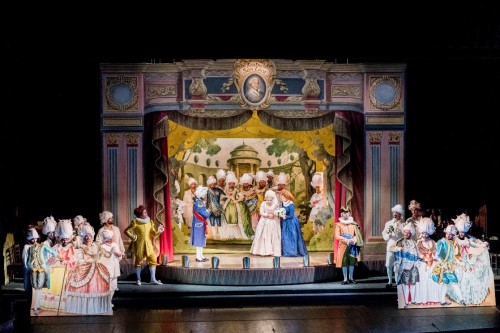 Italy Donizetti Opera Festival [2]: Enrico di Borgogna: Academia Montis Regalis, Donizetti Opera Chorus / Alessandro de Marchi (conductor), Teatro Sociale, Bergamo, 25.11.2018. (JMI)
Italy Donizetti Opera Festival [2]: Enrico di Borgogna: Academia Montis Regalis, Donizetti Opera Chorus / Alessandro de Marchi (conductor), Teatro Sociale, Bergamo, 25.11.2018. (JMI)

Cast:
Enrico – Anna Bonitatibus
Elisa – Sonia Ganassi
Guido – Levy Sekgapane
Pietro – Francesco Castoro
Gilberto – Luca Tittoto
Geltrude – Federica Vitali
Brunone– Lorenzo Barbieri
Nicola – Matteo Mezzaro
Production:
Direction – Silvia Paoli
Sets – Andrea Belli
Costumes – Valeria Donata Bettella
Lighting – Fiammetta Baldiserri
Enrico di Borgogna was the third opera that Gaetano Donizetti wrote but the first to be staged. That event took place at the Teatro San Luca in Venice and was made possible with the help of Johann Mayr, Donizetti’s teacher, who at the time was quite active as a composer. Donizetti was then 21 years old. The work wasn’t an indisputable triumph, but it was reasonably well received by the public.
Some eleven years passed between the composition of Enrico di Borgogna and Il castello de Kenilworth, the opera seen here a day earlier (review click here), and the progression musically in Donizetti’s work is remarkable. One could describe the first opera as written in a kind of Rossini style and with a reduced orchestra, while Il castello is much more recognizably Donizetti’s work.
Enrico di Borgogna tells of the usurpation of the Burgundy throne by the king’s brother and its subsequent recovery by the rightful heir, the murdered king’s son, Enrico. And then there is Elisa, who is desired by both the usurper’s son, Guido, and by Enrico, who will eventually depose his rival and win Elisa. While this is obviously a drama in music, there is also a somewhat buffo character: Gilberto, Guido’s assistant. The two main protagonists (Enrico and Elisa) are sung by mezzo-sopranos, while Guido is a light tenor; a second tenor is Pietro, who saved Enrico’s life as a small child and educated him.
I wanted to draw attention to the drama of the opera to highlight the capriciousness of the production’s director, Silvia Paoli, who has turned this drama into a farce. It is staged as if it were a performance in a little eighteenth-century theater, the San Luca according to the sign, where everything is treated as opera buffa. It made little sense to me, and the clash between what one sees and what one hears led to boredom.
Conductor Alessandro de Marchi is well known for his work in Baroque opera, and drew a fine performance from the Academia Montis Regalis and the Donizetti Opera Chorus.
The role of Enrico was played by mezzo-soprano Anna Bonitatibus, who did very nicely. She was especially convincing in the second part of the opera, which is where the opera gave her more opportunities to shine.
Elisa, the object of desire of the usurper and the usurped, was interpreted by mezzo-soprano Sonia Ganassi, whom I had not seen on stage for three years. Her performance was correct beyond some acting excesses (for which she was not responsible), but I found her voice less bright than previously.
Tenor Levy Sekgapane has an attractive voice and was a correct Guido, as was Francesco Castoro in the role of Pietro. Luca Tittoto gave life to Gilberto, with a broad voice and a strong presence on stage. Good too were the performances of Federica Vitali as Elisa’s maid, Geltrude, Lorenzo Barbieri as Brunone and Matteo Mezzaro as Nicola.
José M. Irurzun
